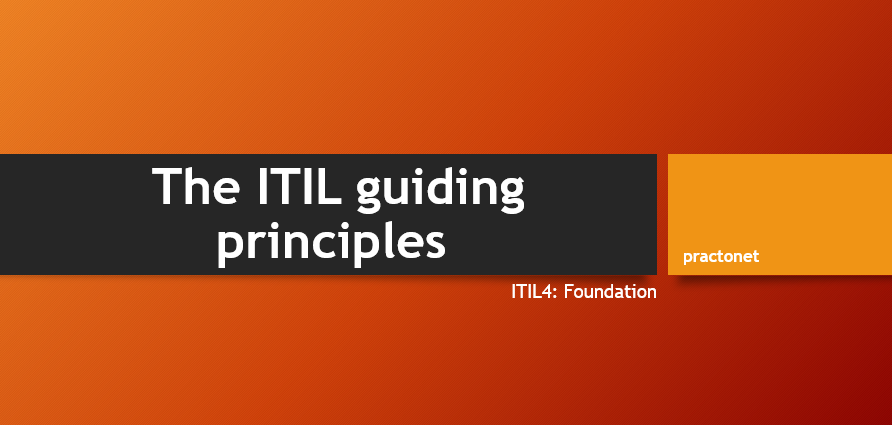A guiding principle is a recommendation that guides an organization in all circumstances, regardless of changes in its goals, strategies, type of work, or management structure. A guiding principle is universal and enduring.
| Guiding Principle | Description |
|---|---|
| Focus on value | Everything that the organization does needs to map, directly or indirectly, to value for the stakeholders. The focus on value principle encompasses many perspectives, including the experience of customers and users. |
| Start where you are | Do not start from scratch and build something new without considering what is already available to be leveraged. There is likely to be a great deal in the current services, processes, programmes, projects, and people that can be used to create the desired outcome. The current state should be investigated and observed directly to makesure it is fully understood. |
| Progress iteratively with feedback | Do not attempt to do everything at once. Even huge initiatives must be accomplished iteratively. By organizing work into smaller, manageable sections that can be executed and completed in a timely manner, it is easier to maintain a sharper focus on each effort. Using feedback before, throughout, and after each iteration will ensure that actions are focused and appropriate, even if circumstances change. |
| Collaborate and promote visibility | Working together across boundaries produces results that have greater buy-in, more relevance to objectives, and increased likelihood of long-term success. Achieving objectives requires information, understanding, and trust. Work and consequences should be made visible, hidden agendas avoided, and information shared to the greatest degree possible. |
| Think and work holistically | No service, or element used to provide a service, stands alone. The outcomes achieved by the service provider and service consumer will suffer unless the organization works on the service as a whole, not just on its parts. Results are delivered to internal and external customers through the effective and efficient management and dynamic integration of information, technology, organization, people, practices, partners, and agreements, which should all be coordinated to provide a defined value. |
| Keep it simple and practical | If a process, service, action or metric fails to provide value or produce a useful outcome, eliminate it. In a process or procedure, use the minimum number of steps necessary to accomplish the objective(s). Always use outcome-based thinking to produce practical solutions that deliver results. |
| Optimize and automate | Resources of all types, particularly HR, should be used to their best effect. Eliminate anything that is truly wasteful and use technology to achieve whatever it is capable of. Human intervention should only happen where it really contributes value. |
The guiding principles defined here embody the core messages of ITIL and of service management in general, supporting successful actions and good decisions of all types and at all levels. They can be used to guide organizations in their work as they adopt a service management approach and adapt ITIL guidance to their own specific needs and circumstances. The guiding principles encourage and support organizations in continual improvement at all levels. These principles are also reflected in many other frameworks, methods, standards, philosophies, and/or bodies of knowledge, such as Lean, Agile, DevOps, and COBIT. This allows organizations to effectively integrate the use of multiple methods into an overall approach to service management. The guiding principles are applicable to practically any initiative and to all relationships with stakeholder groups. For example, the first principle, focus on value, can (and should) be applied not only to service consumers, but to all relevant stakeholders and their respective definitions of value.





